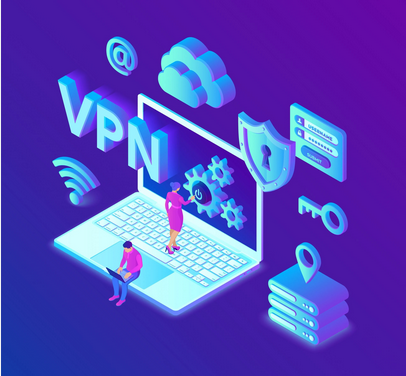Many countries let people use virtual private networks (VPNs) to keep their online behavior safe. But it’s not allowed in many countries, such as those with authoritarian governments.
In this post, we’ll talk about the countries that have restricted VPN use and those that are allowed.
What is a VPN?
Before you can figure out why VPNs are banned in some countries, you must know what they are and what they can do.
A VPN is made to keep your viewing private, secure, and anonymous. It does this, for example, by changing your IP address.

To prevent unauthorized parties from getting any information, a VPN scrambles readable data and makes it unreadable by encrypting it. To make this possible, it uses a cryptographic key so that any plain text from the sender can be turned into ciphertext using mathematical numbers.
For encryption to work, the process must be complicated enough to make it impossible for bots or scripts to use brute force (or trial-and-error guessing using every combination) to break the ciphertext. A VPN makes it more difficult for hackers to break passwords or read your personal information.
VPNs are used for many different reasons. For example, you can change your location and unblock streaming material to watch US TV outside the US.
Why Some Countries Ban VPNs
In the US and other countries that accept VPNs, there are still some rules about how they can be used. For example, streaming or downloading copy-protected material illegally is not allowed. It is against the law to use the dark web to buy or sell illegal things. Lastly, the law makes it illegal and punishable to encourage abuse or do bad things like hacking.
But in some countries, VPN is not allowed or is heavily restricted for the following reasons:
- The state government has strict rules about control.
- Absolute control over citizens through authoritarian government
- Morals and ideals based on religion need to be protected.
- Stopping uprisings and acts of terrorism
In most cases, it is punishable by law to use a VPN in a country where doing so is illegal. In places where it is heavily regulated, on the other hand, there may not be any direct punishments from the government. Still, there may be indirect consequences like disconnections and warnings.
Updated List of Countries Ban or Heavily Regulates VPN

VPN use is banned in many countries because of authoritarian governments, which is a common theme. Here is an updated list of all the countries that have restricted the use of a VPN:
- Belarus – made VPNs and The Onion Router (Tor) illegal in 2015, and it is illegal to hold a protest.
- China – “Great Firewall” blocks websites like Google and Facebook and VPN services to control information; some VPN providers have been prosecuted.
- Iraq – has banned VPNs, social media sites, and chat apps.
North Korea has banned the Internet and only allows a state intranet. - North Korea – has banned the Internet and only allows a state intranet. However, tourists can access the Internet with 3G but not with a VPN.
- Russia –
- has banned VPNs since 2017 to keep political information from entering the country.
Here is an updated list of all the countries where VPN use is heavily regulated:
- Egypt – has legalized VPN use, but services and websites are often blocked.
- Iran – only allows citizens to use VPNs from service providers that have registered with the government. The government blocks Facebook, Twitter, and YouTube but is more worried about acts of rebellion. online
- Oman – heavily controls the Internet but allows VPN use as long as the Sultanate permits the service.
- Turkey – allows VPNs to be used but has punished VPN companies by blocking them.
- Turkmenistan – officially banned VPNs in 2015; it has only one ISP, which the government runs, and there have been reports of blocked VPN access.
- United Arab Emirates (UAE) – allows VPNs but has laws against using them to commit crimes or access content that lowers the country’s moral standards.
Updated List of Countries Where VPNs are Legal
Here is an updated list of all the countries where VPNs are permitted for use by citizens:
- Antigua and Barbuda
- Argentina
- Armenia
- Aruba
- Australia
- Austria
- Azerbaijan
- Bahamas
- Bahrain
- Bangladesh
- Barbados
- Belgium
- Belize
- Benin
- Bhutan
- Bolivia
- Bosnia and Herzegovina
- Botswana
- Brazil
- Brunei
- Bulgaria
- Burkina Faso
- Burundi
- Cambodia
- Cameroon
- Canada
- Cape Verde
- Central African Republic
- Chad
- Chile
- Colombia
- Comoros
- Democratic Republic of the Congo
- Republic of the Congo
- Costa Rica
- Côte d’Ivoire
- Croatia
- Cuba
- Curacao
- Cyprus
- Czech Republic
- Denmark
- Djibouti
- Dominica
- Dominican Republic
- Ecuador
- Egypt
- El Salvador
- Equatorial Guinea
- Eritrea
- Estonia
- Ethiopia
- Fiji
- Finland
- France
- Gabon
- Gambia
- Georgia
- Germany
- Ghana
- Greece
- Grenada
- Guatemala
- Guinea
- Guinea-Bissau
- Guyana
- Haiti
- Honduras
- Hungary
- Iceland
- India
- Indonesia
- Ireland
- Israel
- Italy
- Jamaica
- Japan
- Jordan
- Kazakhstan
- Kenya
- Kiribati
- Kosovo
- Kuwait
- Kyrgyzstan
- Laos
- Latvia
- Lebanon
- Lesotho
- Liberia
- Libya
- Liechtenstein
- Lithuania
- Luxembourg
- Macedonia
- Madagascar
- Malawi
- Malaysia
- Maldives
- Mali
- Malta
- Marshall Islands
- Mauritania
- Mauritius
- Mexico
- Micronesia
- Moldova
- Monaco
- Mongolia
- Montenegro
- Morocco
- Mozambique
- Myanmar
- Namibia
- Nauru
- Nepal
- Netherlands
- New Zealand
- Nicaragua
- Niger
- Nigeria
- Norway
- Pakistan
- Palau
- Palestine
- Panama
- Papua New Guinea
- Paraguay
- Peru
- Philippines
- Poland
- Portugal
- Qatar
- Romania
- Rwanda
- Saint Kitts and Nevis
- Saint Lucia
- Saint Vincent and the Grenadines
- Samoa
- San Marino
- Sao Tome and Principe
- Saudi Arabia
- Senegal
- Serbia
- Seychelles
- Sierra Leone
- Singapore
- Sint Maarten
- Slovakia
- Slovenia
- Solomon Islands
- Somalia
- South Africa
- South Korea
- South Sudan
- Spain
- Sri Lanka
- Sudan
- Suriname
- Swaziland
- Sweden
- Switzerland
- Syria
- Taiwan
- Tajikistan
- Tanzania
- Thailand
- Timor-Leste
- Togo
- Tonga
- Trinidad and Tobago
- Tunisia
- Tuvalu
- Uganda
- Ukraine
- United Kingdom
- United States of America
- Uruguay
- Uzbekistan
- Vanuatu
- Vatican City
- Venezuela
- Vietnam
- Yemen
- Zambia
- Zimbabwe
Frequently Asked Questions
Can I get in trouble for using a VPN?
If you live in a country where VPN is restricted or illegal, you could get in trouble for using it. So if you want to visit any of these places, you should learn more about them first.
How do I know that I’m not violating any laws when using VPN?
Before you do anything, check for any current restrictions on certain online practices and activities so you keep all of the rules in the service agreement.
What can you do if VPN is legal in your country?
Since there are no laws against using a VPN for encrypting your internet data, you can enjoy surfing the web while maintaining your privacy and security. So choose a VPN service you can trust.




























































































































































































